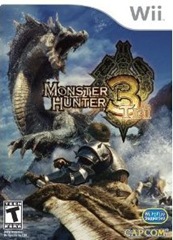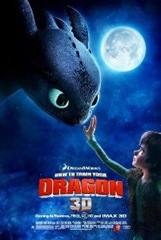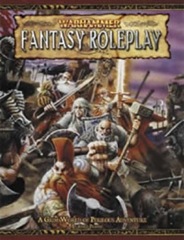
My current avatar for the game is female. Much prefer to watch her slay monsters than him, don't you think?
I’ve been playing Monster Hunter Tri for the Wii over the last week. Still working through the offline game so far. There has been a lot of hype about this game, but it matches up to what I expected, which isn’t the same as what is hyped. I debated with myself if I would get my money’s worth out of it as it appears to be a game that requires a bit of a time commitment (and a bit of “grinding”, something I swore I’d never waste my time doing), but in the end, it was watching How to Train a Dragon for a second time with the kids that changed my mind.
Like what excites me in tabletop gaming, it’s the experience I’m after when I play a computer game, be that pure fun or a thrilling adventure. One of the first games I got for the Wii was Resident Evil 4 (I never played any of the others in the series) and the first few hours of play were great. A lovely creepy, mysterious and thrilling experience. I’m not sure how much I’ve done of it, but it’s gotten to the point that the experience has worn off and I’m just playing a game; managing ammo, expecting the ridiculous and impossible twists, the pointless searching of tunnels and out-of-place puzzles. I think this is because I have the time/attention-span of a casual player but the desires of a hardcore player. I don’t play long enough that the experience carries me most of the way. (Zelda has done the same to me, I can’t believe after getting the armour together I have to go explore yet another nine dungeons or something.)

We've watched it twice, once in 2D and once in 3D. The 3D doesn't add much. Still loved it, loads of gamer references :)
Watching How to Train a Dragon again, the final battle between the Vikings and the great dragon, just reminded me of the trailers and screenshots of Monster Hunter Tri, and it struck me. MHT has a wonderful simple premise. One that would work just as easily as a quick game or a much larger roleplaying experience. Though I’m not interested in computer gaming roleplaying (this isn’t a slight against WOW players or anything, I’m just not interested in it), it occurred to me that it’d make a great premise for a tabletop roleplaying game.
My big chip about tabletop RPG fantasy games is that they are often highly detailed evolved worlds. Lots of rich source to explore when you play. A lot of people love this I know, but I guess I’m a little different. This, to a degree, puts me off because it presents a learning curve to the world. To make a proper character to roleplay means you should, at the least, have a good idea of the world you’re creating the character for. A detailed fantasy RPG makes me feel I should have a strong knowledge of the world before play and, quite often, you have tons of choice. And when you have too much choice, you have no choice, in a way. I could pick up a Lord of the Rings RPG because I’m a fan of the books, but Exalted wears me down. Riddle of Steel has a great combat mechanic, which makes it stand out, but the setting is detailed and dense, putting me off the setting part.
But that’s why I think MHT is fascinating. It doesn’t offer a fantasy world. It offers a premise. You are a hunter of monsters. You have seven (I think) different types of weapons to specialise in (compared to pages of detailed descriptions of medieval-inspired weapons for example). But by using different materials, buying charms, etc. you can make these weapons quite unique. The game starts you in a village, and gets you to hunt different types of monsters (and doing some grinding too) and you learn about the monsters in play. You don’t start with a big list, you build your knowledge via experience. You don’t have tons of choice, you are a hunter and you have several weapon-types to specialise in, but it does offer quite a range of customisation the more you play. (Which was one of the things that attracted me to the game, being able to create a fairly unique character.)
If you had a decent tabletop RPG mechanic for combat fighting the monsters, you could adopt a similar premise. Start small, add bits to the world (new monsters, towns, NPCs) as the players get better. Having such a simple premise would make it easy to layer on top bigger narratives as the players get more confident and attached to the world, suggesting hints of a possible invasion or conspiracies of a far away empire, etc.

Great old school RPG and I had a great character, a young teenager trying to become a warrior... which he did and became scary good!
My GM has gotten himself an job (good for him) and is now travelling the world, so we haven’t gotten to finish our “The Enemy Within” campaign, set in the Warhammer Fantasy world (1st Edition mind you so “old school”). This campaign worked because all of the players rolled up characters instead of creating them. Our initial choices were made by the dice. It allowed us to create basic characters with not that much pre-existing knowledge of the world. The campaign then set us off with our group direction and carried us around the world to the point we learned the world in play.
Anything that gets in the way of experience, takes from the whole thing. Just as with writing, anything that jars the reader from work is bad. You don’t want your reader to be correcting your grammar or laughing when they shouldn’t be at the way one of your character’s talk, how will they take anything else seriously? The same goes for roleplaying books and playing them. And for me the “burden” of a huge setting that I can’t relate it to or hang it on something is really off-putting. Warhammer fantasy is sort like a European medieval/renaissance alternative history (with Elves and Halflings) and it does it well. There’s my hook. Post-apocalyptic settings are also based on the modern world but imagined after the big bomb. Modern day games, such as urban fantasy concepts (like most of White’ Wolf’s World Of Darkness games), I can grok too.
The same also applies to far future based worlds, where the technology and science are so far advanced, they are incomprehensible as anything other than magic. Though I sometimes feel that there is something more interesting in such settings, because they ask the question, what’s going to happen to humanity? But then you’re playing, not a human, or at least not a modern human, but someone or thing so advanced that they are effectively alien.
And that’s the other thing that bugs me some what about fantasy worlds. They often shoe-horn in modern perspectives in very different worlds. Sometimes this can work when the setting doesn’t take itself too seriously, or it’s close enough to the readers world that its easy to get. But it can sometimes lead to claims or appearance of “cultural misappropriation” or it can be used by players to hide anti-game decisions (“that’s what a follower of X would do!”). So personally I prefer human or close-enough to human type characters. I’m not saying you can’t have a game or play a game where characters are significantly different, but there is a point when a human becomes too alien to play convincingly or to have a good experience with as a player, unless it’s down simply for kicks.
In Lost Heroes I make an explicit ruling on this. I say something like: “you can play a human that can turn into a dragon, but you can’t play a dragon that turns into a human.” The difference is subtle.
Okay, this post has become a lot longer than I intended. Must stop rambling. All really to say I think the premise of MHT would make an interesting tabletop RPG game.
“All I really wnat to say I think the premise of MHT would make an interesting tabletop RPG game.”
I hadn’t considered this before, but you’re right. I think it would too. Have you found anyone pursuing something in this direction?
Hi Steve Marshall,
I haven’t found anyone pursuing such an idea. Sadly I didn’t find much interest to my post originally and few of my gamer friends actually play MHT. (I’m still playing the game myself)
Actually, there is somebody who went ahead and created a whole MHT roleplay website not too long ago.
http://www.mhtrpg.proboards.com
I hope that helps you, as I am the creator. If you know anybody who might be interested, please do have them join as well.